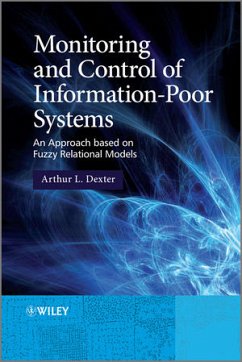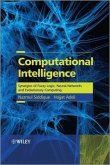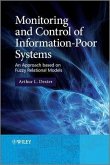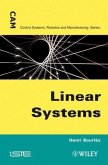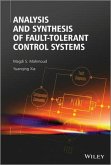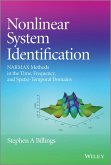Monitoring and Control of Information-Poor Systems (eBook, PDF)
An Approach based on Fuzzy Relational Models


Alle Infos zum eBook verschenken

Monitoring and Control of Information-Poor Systems (eBook, PDF)
An Approach based on Fuzzy Relational Models
- Format: PDF
- Merkliste
- Auf die Merkliste
- Bewerten Bewerten
- Teilen
- Produkt teilen
- Produkterinnerung
- Produkterinnerung

Hier können Sie sich einloggen

Bitte loggen Sie sich zunächst in Ihr Kundenkonto ein oder registrieren Sie sich bei bücher.de, um das eBook-Abo tolino select nutzen zu können.
The monitoring and control of a system whose behaviour is highly uncertain is an important and challenging practical problem. Methods of solution based on fuzzy techniques have generated considerable interest, but very little of the existing literature considers explicit ways of taking uncertainties into account. This book describes an approach to the monitoring and control of information-poor systems that is based on fuzzy relational models which generate fuzzy outputs. The first part of Monitoring and Control of Information-Poor Systems aims to clarify why design decisions must take account…mehr
- Geräte: PC
- mit Kopierschutz
- eBook Hilfe
- Größe: 11.26MB
![Computational Intelligence (eBook, PDF) Computational Intelligence (eBook, PDF)]() Nazmul SiddiqueComputational Intelligence (eBook, PDF)110,99 €
Nazmul SiddiqueComputational Intelligence (eBook, PDF)110,99 €![Monitoring and Control of Information-Poor Systems (eBook, ePUB) Monitoring and Control of Information-Poor Systems (eBook, ePUB)]() Arthur L. DexterMonitoring and Control of Information-Poor Systems (eBook, ePUB)110,99 €
Arthur L. DexterMonitoring and Control of Information-Poor Systems (eBook, ePUB)110,99 €![Linear Systems (eBook, PDF) Linear Systems (eBook, PDF)]() Henri BourlèsLinear Systems (eBook, PDF)160,99 €
Henri BourlèsLinear Systems (eBook, PDF)160,99 €![Analysis and Synthesis of Fault-Tolerant Control Systems (eBook, PDF) Analysis and Synthesis of Fault-Tolerant Control Systems (eBook, PDF)]() Magdi S. MahmoudAnalysis and Synthesis of Fault-Tolerant Control Systems (eBook, PDF)110,99 €
Magdi S. MahmoudAnalysis and Synthesis of Fault-Tolerant Control Systems (eBook, PDF)110,99 €![Nonlinear System Identification (eBook, PDF) Nonlinear System Identification (eBook, PDF)]() Stephen A. BillingsNonlinear System Identification (eBook, PDF)117,99 €
Stephen A. BillingsNonlinear System Identification (eBook, PDF)117,99 €![Set-theoretic Fault-tolerant Control in Multisensor Systems (eBook, PDF) Set-theoretic Fault-tolerant Control in Multisensor Systems (eBook, PDF)]() Florin StoicanSet-theoretic Fault-tolerant Control in Multisensor Systems (eBook, PDF)139,99 €
Florin StoicanSet-theoretic Fault-tolerant Control in Multisensor Systems (eBook, PDF)139,99 €![Sliding Mode Control of Uncertain Parameter-Switching Hybrid Systems (eBook, PDF) Sliding Mode Control of Uncertain Parameter-Switching Hybrid Systems (eBook, PDF)]() Ligang WuSliding Mode Control of Uncertain Parameter-Switching Hybrid Systems (eBook, PDF)110,99 €
Ligang WuSliding Mode Control of Uncertain Parameter-Switching Hybrid Systems (eBook, PDF)110,99 €-
-
-
Dieser Download kann aus rechtlichen Gründen nur mit Rechnungsadresse in A, B, BG, CY, CZ, D, DK, EW, E, FIN, F, GR, HR, H, IRL, I, LT, L, LR, M, NL, PL, P, R, S, SLO, SK ausgeliefert werden.
- Produktdetails
- Verlag: John Wiley & Sons
- Seitenzahl: 312
- Erscheinungstermin: 1. Februar 2012
- Englisch
- ISBN-13: 9781119945871
- Artikelnr.: 37354516
- Verlag: John Wiley & Sons
- Seitenzahl: 312
- Erscheinungstermin: 1. Februar 2012
- Englisch
- ISBN-13: 9781119945871
- Artikelnr.: 37354516
BEHAVIOUR OF INFORMATION-POOR SYSTEMS 1 Characteristics of Information-Poor
Systems 3 1.1 Introduction to Information-Poor Systems 3 1.1.1 Blast
Furnaces 3 1.1.2 Container Cranes 3 1.1.3 Cooperative Control Systems 4
1.1.4 Distillation Columns 4 1.1.5 Drug Administration 4 1.1.6 Electrical
Power Generation and Distribution 4 1.1.7 Environmental Risk Assessment
Systems 4 1.1.8 Financial Investment and Portfolio Selection 5 1.1.9 Health
Care Systems 5 1.1.10 Indoor Climate Control 5 1.1.11 NOx Emissions from
Gas Turbines and Internal Combustion Engines 6 1.1.12 Penicillin Production
Plant 6 1.1.13 Polymerization Reactors 6 1.1.14 Rotary Kilns 6 1.1.15 Solar
Power Plant 7 1.1.16 Wastewater Treatment Plant 7 1.1.17 Wood Pulp
Production Plant 7 1.2 Main Causes of Uncertainty 7 1.2.1 Sources of
Modelling Errors 8 1.2.2 Sources of Measurement Errors 8 1.2.3 Reasons for
Poorly Defined Objectives and Constraints 9 1.3 Design in the Face of
Uncertainty 9 References 9 2 Describing and Propagating Uncertainty 13 2.1
Methods of Describing Uncertainty 13 2.1.1 Uncertainty Intervals and
Probability Distributions 13 2.1.2 Fuzzy Sets and Fuzzy Numbers 14 2.2
Methods of Propagating Uncertainty 15 2.2.1 Interval Arithmetic 15 2.2.2
Statistical Methods 16 2.2.3 Monte Carlo Methods 16 2.2.4 Fuzzy Arithmetic
17 2.3 Fuzzy Arithmetic Using ±-Cut Sets and Interval Arithmetic 18 2.4
Fuzzy Arithmetic Based on the Extension Principle 21 2.5 Representing and
Propagating Uncertainty Using Pseudo-Triangular Membership Functions 24 2.6
Summary 27 References 27 3 Accounting for Measurement Uncertainty 29 3.1
Measurement Errors 29 3.2 Introduction to Fuzzy Random Variables 29 3.2.1
Definition of a Fuzzy Random Variable 30 3.2.2 Generating Fuzzy Random
Variables from a Knowledge of the Random and Systematic Errors 30 3.3 A
Hybrid Approach to the Propagation of Uncertainty 32 3.4 Fuzzy Sensor
Fusion Based on the Extension Principle 34 3.5 Fuzzy Sensors 38 3.6 Summary
39 References 39 4 Accounting for Modelling Errors in Fuzzy Models 41 4.1
An Introduction to Rule-Based Models 41 4.2 Linguistic Fuzzy Models 41
4.2.1 Fuzzy Rules 41 4.2.2 Fuzzy Inferencing 42 4.2.3 Compositional Rules
of Inference 43 4.3 Functional Fuzzy Models 47 4.4 Fuzzy Neural Networks 48
4.5 Methods of Generating Fuzzy Models 50 4.5.1 Modifying Expert Rules to
Take Account of Uncertainty 50 4.5.2 Identifying Fuzzy Rules from Data 56
4.6 Defuzzification 58 4.7 Summary 60 References 60 5 Fuzzy Relational
Models 63 5.1 Introduction to Fuzzy Relations and Fuzzy Relational Models
63 5.2 Fuzzy FRMs 65 5.3 Methods of Estimating Rule Confidences from Data
67 5.4 Estimating Probability Density Functions from Data 70 5.4.1
Probabilistic Interpretation of RSK Fuzzy Identification 71 5.4.2 Effect of
Structural Errors on the Output of a Fuzzy FRM 78 5.4.3 Estimation Based on
Limited Amounts of Training Data 83 5.5 Generic Fuzzy Models 86 5.5.1
Identification of Generic Fuzzy Models 87 5.5.2 Reducing the Time Required
to Generate the Training Data 91 5.6 Summary 92 References 92 II CONTROL OF
INFORMATION-POOR SYSTEMS 6 Fuzzy Decision-Making 97 6.1 Risk Assessment in
Information-Poor Systems 97 6.2 Fuzzy Optimization in Information-Poor
Systems 99 6.2.1 Fuzzy Goals and Fuzzy Constraints 99 6.2.2 Fuzzy
Aggregation Operators 99 6.2.3 Fuzzy Ranking 100 6.3 Multi-Stage
Decision-Making 101 6.3.1 Fuzzy Dynamic Programming 102 6.3.2 Branch and
Bound 103 6.3.3 Genetic Algorithms 106 6.4 Fuzzy Decision-Making Based on
Intuitionistic Fuzzy Sets 106 6.4.1 Definition of an Intuitionistic Fuzzy
Set 106 6.4.2 Multi-Attribute Decision-Making Using Intuitionistic Fuzzy
Numbers 107 6.5 Summary 108 References 108 7 Predictive Control in
Uncertain Systems 111 7.1 Model-Based Predictive Control 111 7.2 Fuzzy
Approaches to Model-Based Control of Uncertain Systems 112 7.2.1 Inverse
Control of Fuzzy Interval Systems 112 7.2.2 Fuzzy Model-Based Predictive
Control 114 7.3 Practical Issues Associated with Multi-Step Fuzzy
Decision-Making 115 7.3.1 Limiting the Accumulation of Uncertainty 115
7.3.2 Avoiding Excessive Computational Demands When Using Enumerative
Search Optimization 115 7.3.3 Avoiding Excessive Computational Demands When
Using Evolutionary Algorithms 116 7.3.4 Handling Infeasibility 117 7.3.5
Choosing the Weighting in Multi-Criteria Cost Functions 117 7.3.6 Dealing
with Hard Constraints 118 7.4 A Simplified Approach to Fuzzy FRM-Based
Predictive Control 118 7.4.1 The Fuzzy Decision-Maker 119 7.4.2 Conditional
Defuzzification 120 7.5 FMPC of an Uncertain Dynamic System Based on a
Generic Fuzzy FRM 122 7.6 Summary 127 References 128 8 Incorporating Fuzzy
Inputs 129 8.1 Fuzzy Setpoints and Fuzzy Measurements 129 8.1.1 Fuzzy
Setpoints 129 8.1.2 Fuzzy Measurements 129 8.2 Fuzzy Measures of the
Tracking Error and its Derivative 131 8.3 Inference with Fuzzy Inputs 136
8.4 Fuzzy Output Neural Networks 138 8.5 Modelling Input Uncertainty Using
a Fuzzy FRM 140 8.6 Summary 151 References 151 9 Disturbance Rejection in
Information-Poor Systems 153 9.1 Rejecting Unmeasured Disturbances in
Uncertain Systems 154 9.1.1 Robust Fuzzy Control 154 9.1.2 Feedback
Linearization Using a Fuzzy Disturbance Observer 155 9.1.3 Fuzzy
Model-Based Internal Model Control 155 9.2 Fuzzy IMC Based on a Fuzzy
Output FRM 157 9.3 Rejecting Measured Disturbances in Non-Linear Uncertain
Systems 161 9.4 Fuzzy MPC with Feedforward 162 9.5 Summary 166 References
166 III ONLINE LEARNING IN INFORMATION-POOR SYSTEMS 10 Online Model
Identification in Information-Poor Environments 171 10.1 Online Fuzzy
Identification Schemes 171 10.1.1 Recursive Fuzzy Least-Squares 171 10.1.2
Recursive Forms of the RSK Algorithm 172 10.2 Effect of Poor-Quality and
Incomplete Training Data 176 10.3 Ways of Reducing the Computational
Demands 177 10.3.1 Evolving Fuzzy Models 177 10.3.2 Hierarchical Fuzzy
Models 181 10.4 Summary 185 References 185 11 Adaptive Model-Based Control
of Information-Poor Systems 187 11.1 Robust Adaptive Fuzzy Control 187 11.2
Adaptive Fuzzy FRM-Based Predictive Control 188 11.3 Commissioning the
Controller 189 11.3.1 Methods of Incorporating Prior Knowledge 189 11.3.2
Initialization Using a Generic Fuzzy FRM 189 11.4 Generating an Optimal
Control Signal Using a Partially Trained Model 192 11.4.1 Taking the Amount
of Training into Account 192 11.4.2 Incorporating a Secondary Controller
194 11.4.3 Combining the Fuzzy Predictions Generated by More than One Model
201 11.5 Dealing with the Effects of Disturbances 202 11.5.1 Adaptive
Feedforward Control Based on an Inaccurate Disturbance Measurement 203 11.6
Summary 209 References 209 12 Adaptive Model-Free Control of
Information-Poor Systems 211 12.1 Introduction to Model-Free Adaptive
Control of Non-Linear Systems 211 12.2 Fuzzy FRM-Based Direct Adaptive
Control 211 12.3 Behaviour in the Presence of a Noisy Measurement of the
Plant Output 213 12.4 Behaviour in the Presence of an Unmeasured
Disturbance 218 12.5 Accounting for Uncertainty Arising from a Measured
Disturbance 222 12.6 Summary 227 References 227 13 Fault Diagnosis in
Information-Poor Systems 229 13.1 Introduction to Fault Detection and
Isolation in Non-Linear Uncertain Systems 229 13.1.1 Model-Based Methods
for Non-Linear Systems 230 13.1.2 Ways of Accounting for Uncertainty 232
13.2 A Fuzzy FRM-Based Fault Diagnosis Scheme 233 13.2.1 Measuring the
Similarity of FRMs 234 13.2.2 Accumulating Evidence of Fault-Free or Faulty
Operation 236 13.2.3 Generating Robust Generic Models of Faulty Operation
239 13.2.4 Multi-Step Fault Diagnosis 239 13.3 Summary 242 References 243
IV SOME EXAMPLE APPLICATIONS 14 Control of Thermal Comfort 247 14.1 Main
Sources of Uncertainty and Practical Considerations 248 14.2 Review of
Approaches Suggested for Dealing with the Uncertainty 249 14.3 Design of
the Fuzzy FRM-Based Control System 249 14.3.1 The Fuzzy FRM 250 14.3.2 The
Fuzzy Cost Functions 252 14.3.3 The Fuzzy Goals 252 14.3.4 The Fuzzy
Decision-Maker 254 14.3.5 The Conditional Defuzzifier 254 14.4 Performance
of the Thermal Comfort Controller 254 14.5 Concluding Remarks 258
References 259 15 Identification of Faults in Air-Conditioning Systems 261
15.1 Main Sources of Uncertainty and Practical Considerations 261 15.2
Design of a Fuzzy FRM-Based Monitoring System for a Cooling Coil Subsystem
263 15.3 Diagnosis of Known Faults in a Simulated Cooling Coil Subsystem
264 15.3.1 Fault-Free Operation 264 15.3.2 Leaky Valve 264 15.3.3 Fouled
Coil 265 15.3.4 Valve Stuck in the Fully Closed Position 266 15.3.5 Valve
Stuck in the Midway Position 267 15.3.6 Valve Stuck in the Fully Open
Position 268 15.4 Commissioning of Air-Handling Units 269 15.5 Concluding
Remarks 272 References 272 16 Control of Heat Exchangers 275 16.1 Main
Sources of Uncertainty and Practical Considerations 275 16.2 Design of a
Fuzzy FRM-Based Predictive Controller 276 16.3 Design of a Fuzzy FRM-Based
Internal Model Control Scheme 283 16.4 Concluding Remarks 290 References
290 17 Measurement of Spatially Distributed Quantities 293 17.1 Review of
Approaches Suggested for Dealing with Sensor Bias 293 17.2 An Example
Application 294 17.2.1 Air Temperature Estimation Using a Single-Point
Sensor with Bias Correction 294 17.2.2 Air Temperature Estimation Based on
Mass and Energy Balances 299 17.3 Using Bias Estimation and Fuzzy Data
Fusion to Improve Automated Commissioning in Air-Handling Units 302 17.3.1
Diagnosis When the Measurement Bias is Estimated Accurately 303 17.3.2
Diagnosis When the Estimate of the Measurement Bias is Inaccurate 303 17.4
Concluding Remarks 305 References 306 Index 309
BEHAVIOUR OF INFORMATION-POOR SYSTEMS 1 Characteristics of Information-Poor
Systems 3 1.1 Introduction to Information-Poor Systems 3 1.1.1 Blast
Furnaces 3 1.1.2 Container Cranes 3 1.1.3 Cooperative Control Systems 4
1.1.4 Distillation Columns 4 1.1.5 Drug Administration 4 1.1.6 Electrical
Power Generation and Distribution 4 1.1.7 Environmental Risk Assessment
Systems 4 1.1.8 Financial Investment and Portfolio Selection 5 1.1.9 Health
Care Systems 5 1.1.10 Indoor Climate Control 5 1.1.11 NOx Emissions from
Gas Turbines and Internal Combustion Engines 6 1.1.12 Penicillin Production
Plant 6 1.1.13 Polymerization Reactors 6 1.1.14 Rotary Kilns 6 1.1.15 Solar
Power Plant 7 1.1.16 Wastewater Treatment Plant 7 1.1.17 Wood Pulp
Production Plant 7 1.2 Main Causes of Uncertainty 7 1.2.1 Sources of
Modelling Errors 8 1.2.2 Sources of Measurement Errors 8 1.2.3 Reasons for
Poorly Defined Objectives and Constraints 9 1.3 Design in the Face of
Uncertainty 9 References 9 2 Describing and Propagating Uncertainty 13 2.1
Methods of Describing Uncertainty 13 2.1.1 Uncertainty Intervals and
Probability Distributions 13 2.1.2 Fuzzy Sets and Fuzzy Numbers 14 2.2
Methods of Propagating Uncertainty 15 2.2.1 Interval Arithmetic 15 2.2.2
Statistical Methods 16 2.2.3 Monte Carlo Methods 16 2.2.4 Fuzzy Arithmetic
17 2.3 Fuzzy Arithmetic Using ±-Cut Sets and Interval Arithmetic 18 2.4
Fuzzy Arithmetic Based on the Extension Principle 21 2.5 Representing and
Propagating Uncertainty Using Pseudo-Triangular Membership Functions 24 2.6
Summary 27 References 27 3 Accounting for Measurement Uncertainty 29 3.1
Measurement Errors 29 3.2 Introduction to Fuzzy Random Variables 29 3.2.1
Definition of a Fuzzy Random Variable 30 3.2.2 Generating Fuzzy Random
Variables from a Knowledge of the Random and Systematic Errors 30 3.3 A
Hybrid Approach to the Propagation of Uncertainty 32 3.4 Fuzzy Sensor
Fusion Based on the Extension Principle 34 3.5 Fuzzy Sensors 38 3.6 Summary
39 References 39 4 Accounting for Modelling Errors in Fuzzy Models 41 4.1
An Introduction to Rule-Based Models 41 4.2 Linguistic Fuzzy Models 41
4.2.1 Fuzzy Rules 41 4.2.2 Fuzzy Inferencing 42 4.2.3 Compositional Rules
of Inference 43 4.3 Functional Fuzzy Models 47 4.4 Fuzzy Neural Networks 48
4.5 Methods of Generating Fuzzy Models 50 4.5.1 Modifying Expert Rules to
Take Account of Uncertainty 50 4.5.2 Identifying Fuzzy Rules from Data 56
4.6 Defuzzification 58 4.7 Summary 60 References 60 5 Fuzzy Relational
Models 63 5.1 Introduction to Fuzzy Relations and Fuzzy Relational Models
63 5.2 Fuzzy FRMs 65 5.3 Methods of Estimating Rule Confidences from Data
67 5.4 Estimating Probability Density Functions from Data 70 5.4.1
Probabilistic Interpretation of RSK Fuzzy Identification 71 5.4.2 Effect of
Structural Errors on the Output of a Fuzzy FRM 78 5.4.3 Estimation Based on
Limited Amounts of Training Data 83 5.5 Generic Fuzzy Models 86 5.5.1
Identification of Generic Fuzzy Models 87 5.5.2 Reducing the Time Required
to Generate the Training Data 91 5.6 Summary 92 References 92 II CONTROL OF
INFORMATION-POOR SYSTEMS 6 Fuzzy Decision-Making 97 6.1 Risk Assessment in
Information-Poor Systems 97 6.2 Fuzzy Optimization in Information-Poor
Systems 99 6.2.1 Fuzzy Goals and Fuzzy Constraints 99 6.2.2 Fuzzy
Aggregation Operators 99 6.2.3 Fuzzy Ranking 100 6.3 Multi-Stage
Decision-Making 101 6.3.1 Fuzzy Dynamic Programming 102 6.3.2 Branch and
Bound 103 6.3.3 Genetic Algorithms 106 6.4 Fuzzy Decision-Making Based on
Intuitionistic Fuzzy Sets 106 6.4.1 Definition of an Intuitionistic Fuzzy
Set 106 6.4.2 Multi-Attribute Decision-Making Using Intuitionistic Fuzzy
Numbers 107 6.5 Summary 108 References 108 7 Predictive Control in
Uncertain Systems 111 7.1 Model-Based Predictive Control 111 7.2 Fuzzy
Approaches to Model-Based Control of Uncertain Systems 112 7.2.1 Inverse
Control of Fuzzy Interval Systems 112 7.2.2 Fuzzy Model-Based Predictive
Control 114 7.3 Practical Issues Associated with Multi-Step Fuzzy
Decision-Making 115 7.3.1 Limiting the Accumulation of Uncertainty 115
7.3.2 Avoiding Excessive Computational Demands When Using Enumerative
Search Optimization 115 7.3.3 Avoiding Excessive Computational Demands When
Using Evolutionary Algorithms 116 7.3.4 Handling Infeasibility 117 7.3.5
Choosing the Weighting in Multi-Criteria Cost Functions 117 7.3.6 Dealing
with Hard Constraints 118 7.4 A Simplified Approach to Fuzzy FRM-Based
Predictive Control 118 7.4.1 The Fuzzy Decision-Maker 119 7.4.2 Conditional
Defuzzification 120 7.5 FMPC of an Uncertain Dynamic System Based on a
Generic Fuzzy FRM 122 7.6 Summary 127 References 128 8 Incorporating Fuzzy
Inputs 129 8.1 Fuzzy Setpoints and Fuzzy Measurements 129 8.1.1 Fuzzy
Setpoints 129 8.1.2 Fuzzy Measurements 129 8.2 Fuzzy Measures of the
Tracking Error and its Derivative 131 8.3 Inference with Fuzzy Inputs 136
8.4 Fuzzy Output Neural Networks 138 8.5 Modelling Input Uncertainty Using
a Fuzzy FRM 140 8.6 Summary 151 References 151 9 Disturbance Rejection in
Information-Poor Systems 153 9.1 Rejecting Unmeasured Disturbances in
Uncertain Systems 154 9.1.1 Robust Fuzzy Control 154 9.1.2 Feedback
Linearization Using a Fuzzy Disturbance Observer 155 9.1.3 Fuzzy
Model-Based Internal Model Control 155 9.2 Fuzzy IMC Based on a Fuzzy
Output FRM 157 9.3 Rejecting Measured Disturbances in Non-Linear Uncertain
Systems 161 9.4 Fuzzy MPC with Feedforward 162 9.5 Summary 166 References
166 III ONLINE LEARNING IN INFORMATION-POOR SYSTEMS 10 Online Model
Identification in Information-Poor Environments 171 10.1 Online Fuzzy
Identification Schemes 171 10.1.1 Recursive Fuzzy Least-Squares 171 10.1.2
Recursive Forms of the RSK Algorithm 172 10.2 Effect of Poor-Quality and
Incomplete Training Data 176 10.3 Ways of Reducing the Computational
Demands 177 10.3.1 Evolving Fuzzy Models 177 10.3.2 Hierarchical Fuzzy
Models 181 10.4 Summary 185 References 185 11 Adaptive Model-Based Control
of Information-Poor Systems 187 11.1 Robust Adaptive Fuzzy Control 187 11.2
Adaptive Fuzzy FRM-Based Predictive Control 188 11.3 Commissioning the
Controller 189 11.3.1 Methods of Incorporating Prior Knowledge 189 11.3.2
Initialization Using a Generic Fuzzy FRM 189 11.4 Generating an Optimal
Control Signal Using a Partially Trained Model 192 11.4.1 Taking the Amount
of Training into Account 192 11.4.2 Incorporating a Secondary Controller
194 11.4.3 Combining the Fuzzy Predictions Generated by More than One Model
201 11.5 Dealing with the Effects of Disturbances 202 11.5.1 Adaptive
Feedforward Control Based on an Inaccurate Disturbance Measurement 203 11.6
Summary 209 References 209 12 Adaptive Model-Free Control of
Information-Poor Systems 211 12.1 Introduction to Model-Free Adaptive
Control of Non-Linear Systems 211 12.2 Fuzzy FRM-Based Direct Adaptive
Control 211 12.3 Behaviour in the Presence of a Noisy Measurement of the
Plant Output 213 12.4 Behaviour in the Presence of an Unmeasured
Disturbance 218 12.5 Accounting for Uncertainty Arising from a Measured
Disturbance 222 12.6 Summary 227 References 227 13 Fault Diagnosis in
Information-Poor Systems 229 13.1 Introduction to Fault Detection and
Isolation in Non-Linear Uncertain Systems 229 13.1.1 Model-Based Methods
for Non-Linear Systems 230 13.1.2 Ways of Accounting for Uncertainty 232
13.2 A Fuzzy FRM-Based Fault Diagnosis Scheme 233 13.2.1 Measuring the
Similarity of FRMs 234 13.2.2 Accumulating Evidence of Fault-Free or Faulty
Operation 236 13.2.3 Generating Robust Generic Models of Faulty Operation
239 13.2.4 Multi-Step Fault Diagnosis 239 13.3 Summary 242 References 243
IV SOME EXAMPLE APPLICATIONS 14 Control of Thermal Comfort 247 14.1 Main
Sources of Uncertainty and Practical Considerations 248 14.2 Review of
Approaches Suggested for Dealing with the Uncertainty 249 14.3 Design of
the Fuzzy FRM-Based Control System 249 14.3.1 The Fuzzy FRM 250 14.3.2 The
Fuzzy Cost Functions 252 14.3.3 The Fuzzy Goals 252 14.3.4 The Fuzzy
Decision-Maker 254 14.3.5 The Conditional Defuzzifier 254 14.4 Performance
of the Thermal Comfort Controller 254 14.5 Concluding Remarks 258
References 259 15 Identification of Faults in Air-Conditioning Systems 261
15.1 Main Sources of Uncertainty and Practical Considerations 261 15.2
Design of a Fuzzy FRM-Based Monitoring System for a Cooling Coil Subsystem
263 15.3 Diagnosis of Known Faults in a Simulated Cooling Coil Subsystem
264 15.3.1 Fault-Free Operation 264 15.3.2 Leaky Valve 264 15.3.3 Fouled
Coil 265 15.3.4 Valve Stuck in the Fully Closed Position 266 15.3.5 Valve
Stuck in the Midway Position 267 15.3.6 Valve Stuck in the Fully Open
Position 268 15.4 Commissioning of Air-Handling Units 269 15.5 Concluding
Remarks 272 References 272 16 Control of Heat Exchangers 275 16.1 Main
Sources of Uncertainty and Practical Considerations 275 16.2 Design of a
Fuzzy FRM-Based Predictive Controller 276 16.3 Design of a Fuzzy FRM-Based
Internal Model Control Scheme 283 16.4 Concluding Remarks 290 References
290 17 Measurement of Spatially Distributed Quantities 293 17.1 Review of
Approaches Suggested for Dealing with Sensor Bias 293 17.2 An Example
Application 294 17.2.1 Air Temperature Estimation Using a Single-Point
Sensor with Bias Correction 294 17.2.2 Air Temperature Estimation Based on
Mass and Energy Balances 299 17.3 Using Bias Estimation and Fuzzy Data
Fusion to Improve Automated Commissioning in Air-Handling Units 302 17.3.1
Diagnosis When the Measurement Bias is Estimated Accurately 303 17.3.2
Diagnosis When the Estimate of the Measurement Bias is Inaccurate 303 17.4
Concluding Remarks 305 References 306 Index 309
